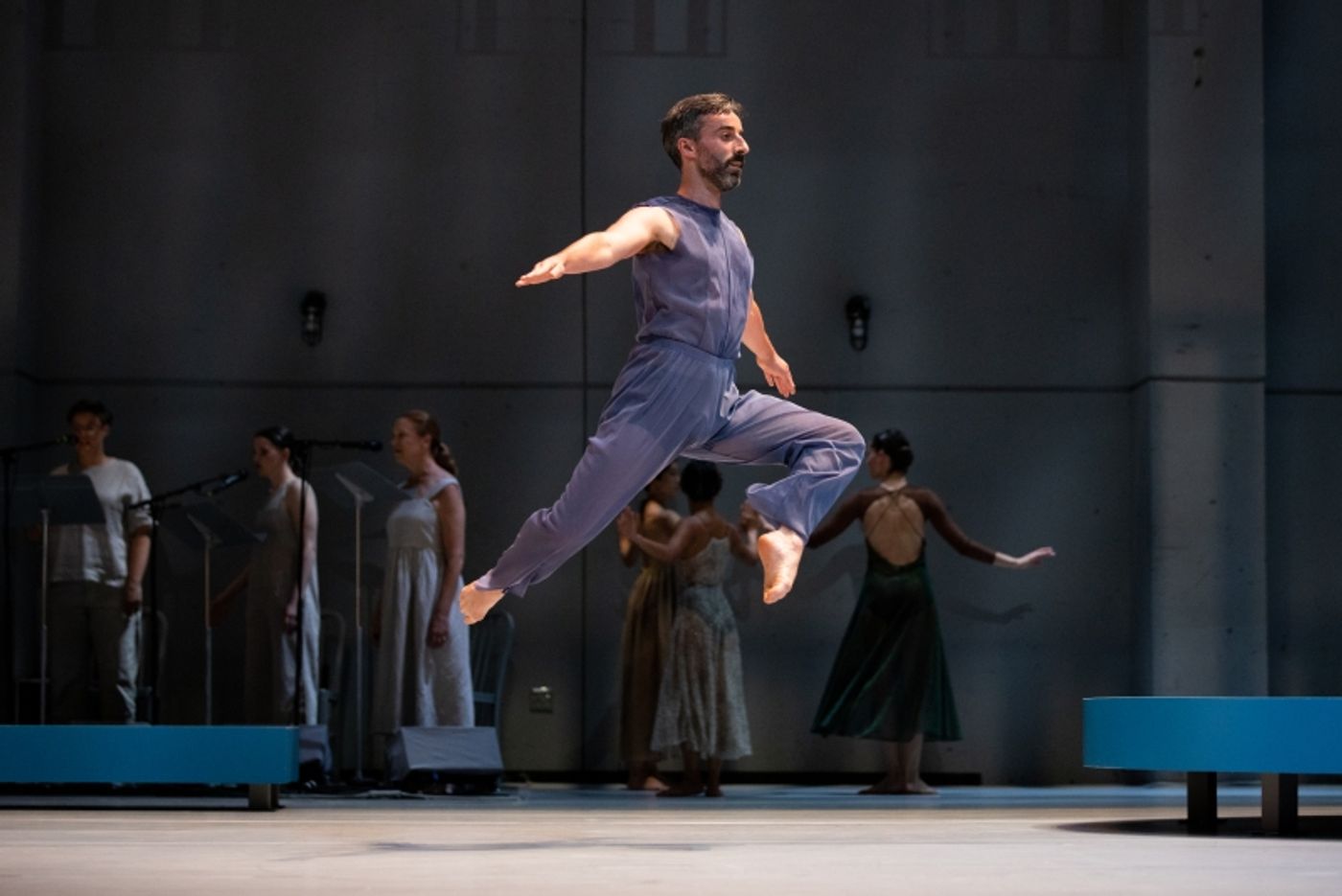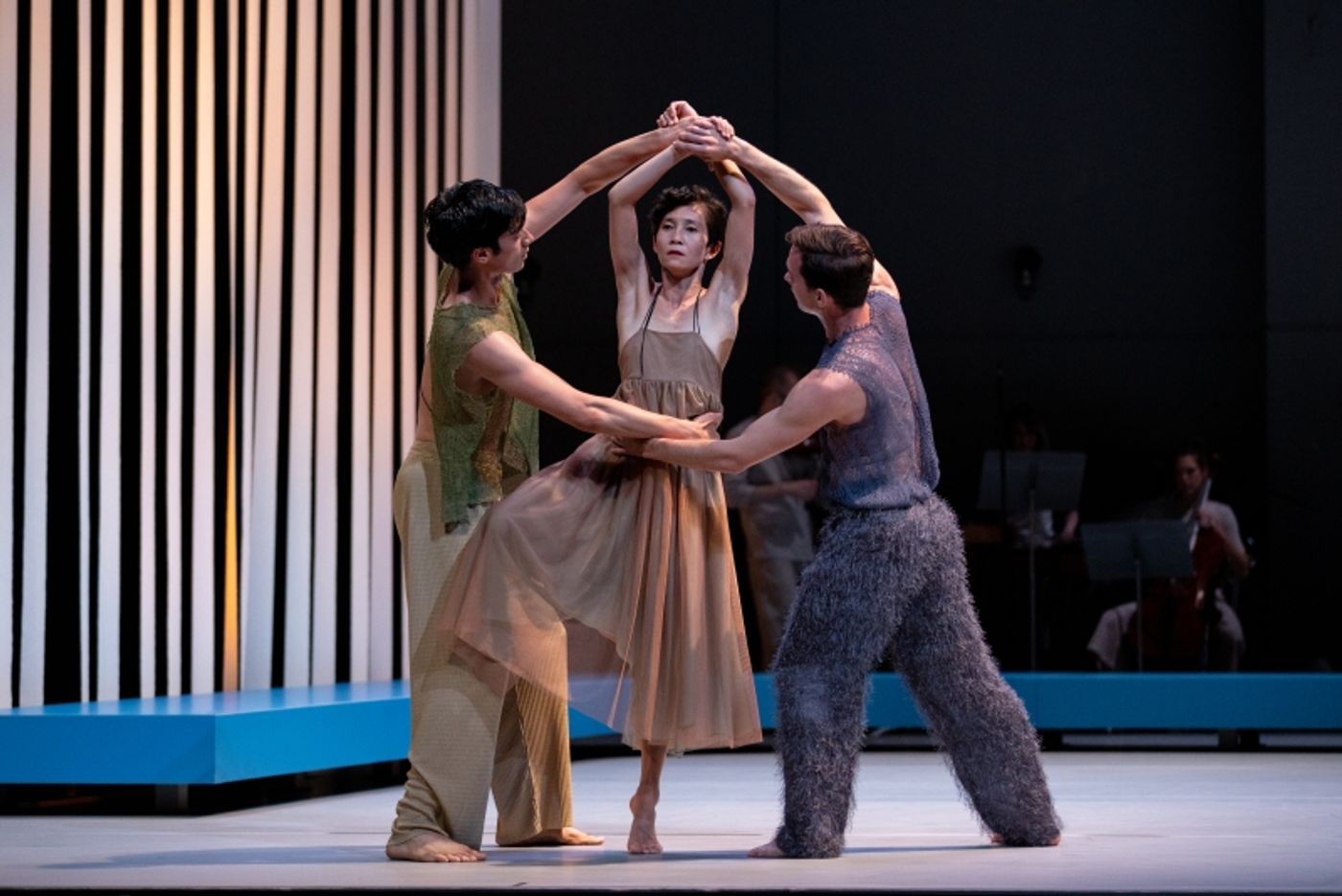Review: SONG OF SONGS, PAM TANOWITZ, Barbican Theatre
Song of Songs doesn't disappoint on any level.

![]()
Song of Songs premiered in 2022 and now has its London opening at the Barbican Centre. The work sees American dance maker Pam Tanowitz collaborate with Pulitzer prize-winning composer David Lang, with both taking inspiration from the poem of the same name which celebrates sexual intimacy found in the Hebrew bible.
It can't be easy being Tanowitz, as there's an undeniable anticipation surrounding her work, but Song of Songs doesn't disappoint on any level.
The set starts some 4ft into the stage space suggesting expanse; white vertical blinds float, unless purposefully disturbed by the dancers, from ceiling to floor on the two sides with cutouts, with the back wall featuring five of the aforementioned rectangular extracts hanging some 10ft high. The space also has three, blue, low standing platforms: curved, linear and spherical. The whole ambiance feeling very 1970s NYC.
The cast of seven (though I think an eighth dancer had only one entrance?!) are all dressed by Tanowitz’s ongoing collaborators Reid Bartelme and Harriet Jung. The first half of the piece sees them sport casual trouser suits, easy skirts and dresses all made of flowing materials that continue the overall, loungey feel.

Before discussing the movement the score needs acknowledging. Lang's composition is both ancient and zeitgeisty in style. Throughout three singers perform text in English that includes words featured in the original poem. Body parts mentioned, senses explained, locations confirmed: "I can see Jerusalem…I can see Lebanon" - what powerful, poignant timing. The onstage, chilled orchestration is very easy on the ear, with the xylophone and soft drum seeming to perpetuate the composer's intention: listen but don't try too hard.
When I was being educated about art as a young ballet student, I remember being taught to feel in relation to appreciation. "If you don't feel anything then the art can't be good", or something along those lines.
Tanowitz is such a different experience. Her work doesn't make one feel in an obvious way, as it neither communicates overt drama or conveys forced beauty. Therefore I find myself observing, appreciating and analysing. In fact the lack of OTT fawning on all sides allows for far more detailed thinking to take place.
Throughout the piece one can recognise and hold onto movement motifs. Most phrases are punctuated with aspects of suspension and fall, and the use of line features often. Tanowitz applies balletic principles to her language but there's a purposeful tone. In classical ballet, the current (distasteful) fashion for leg work is all about the height of extension, whereas Tanowitz uses line to dissect space, involving all of the body to actively break the atmosphere and create image to savour.
In most, if not all forms of technical dance, hopping denotes weakness or failure, Tanowitz however uses it to reinforce a location, repeated rhythm or shape being made by the rest of the body. It's an intriguing and new proposition (acknowledging Cunningham of course).
All of her movement phrasing has a constant juxtaposition between control and abandon. She seemingly makes the active choice not to live in limbo somewhere between the two approaches, but rather to flit vividly between them. We see form, deeply rooted through a grounded supporting leg, or the same initial shape being ricocheted out of the body like an itch or annoyance.

Her groupings are always playing with space, proximity and level (including floor work and mounting the three platforms for short periods). Unison moments feel collectively powerful, then duos and trios randomly split and execute movement on the absolute periphery of the stage space, even using the theatre bare wall as a form of support momentarily.
The dancers change attire two thirds through the piece and reappear in iridescent, halter neck unitards, making the work feel even more dance orientated than it already is. It's difficult to pinpoint the actual end as it's done in classic Tanowitz style: subtly with abstraction and a sense of continuity.
I'm aware it's 2023 and I saw the piece in London, but the ceaseless essence of her work makes me also feel like I could've been on Pluto during the 23rd century. Perhaps Tanowitz makes me feel after all…I'm just not exactly sure what yet.
Song of Songs runs at the Barbican Theatre until 14 October
Photo credit: Maria Baranova
Reader Reviews
Videos

